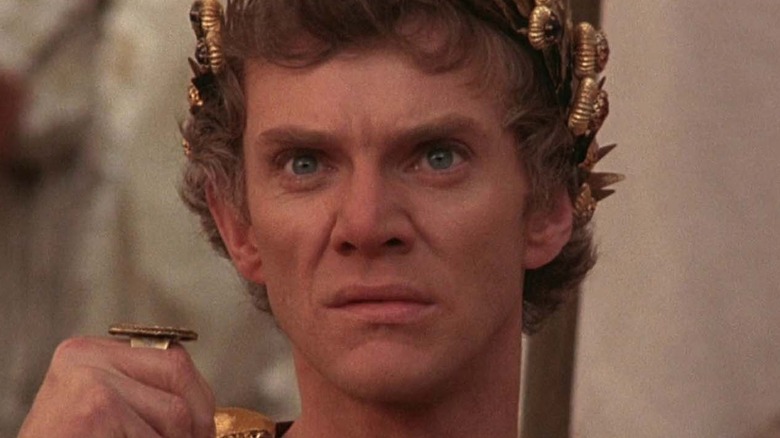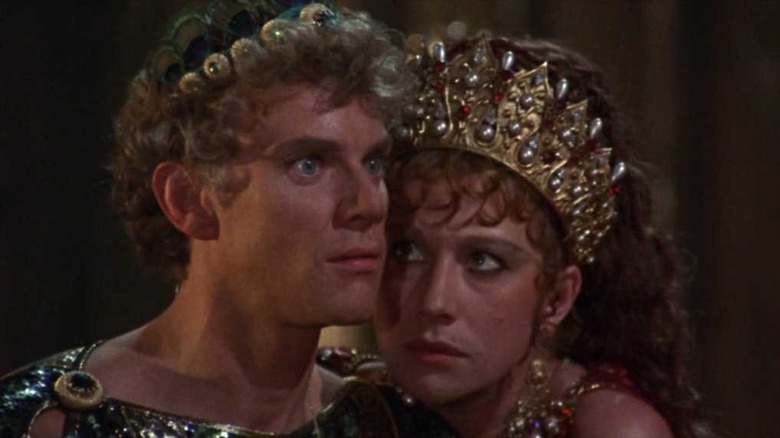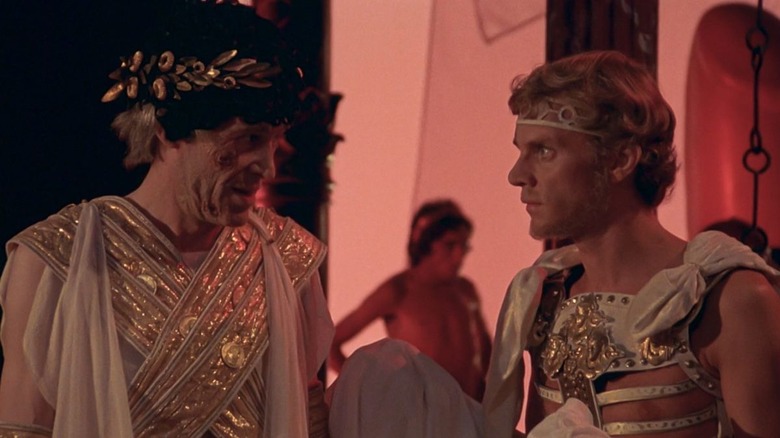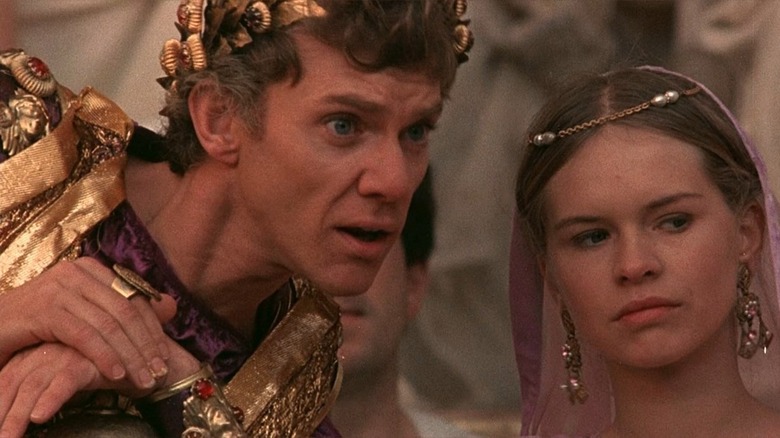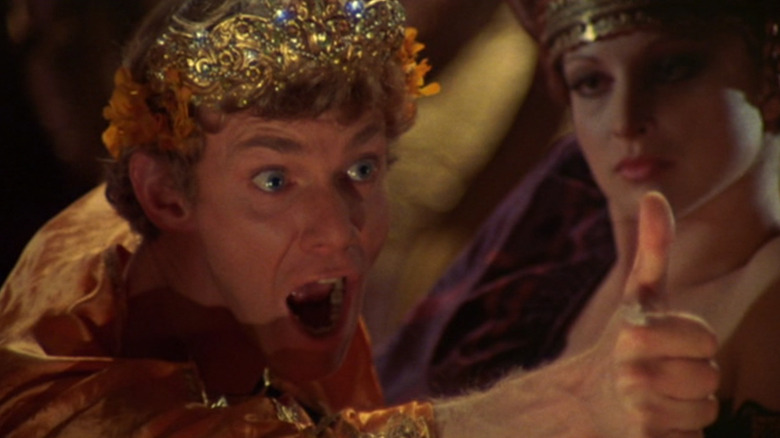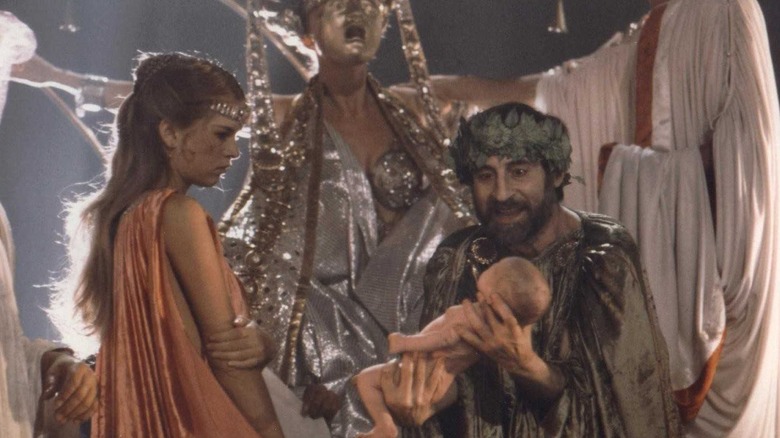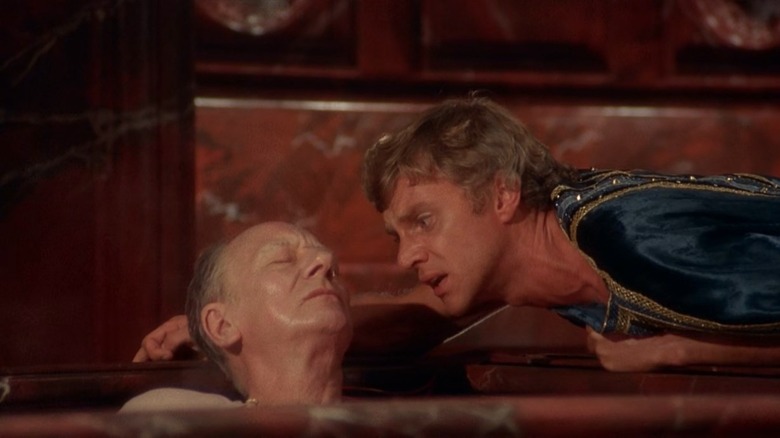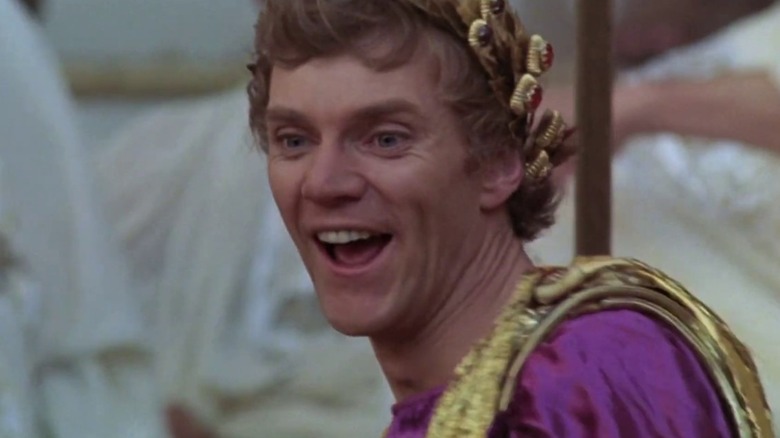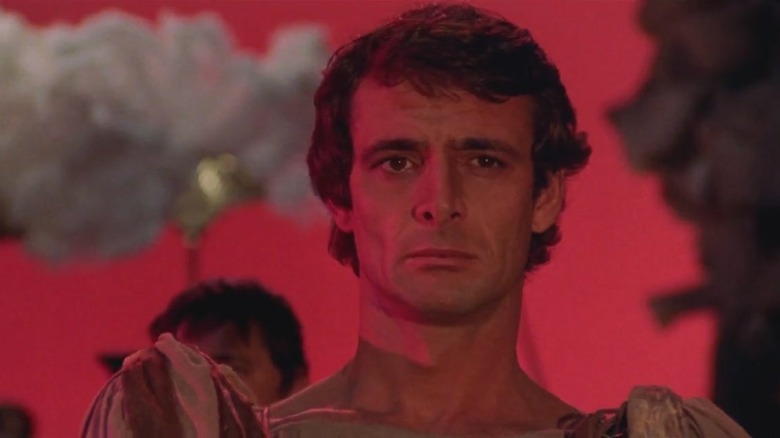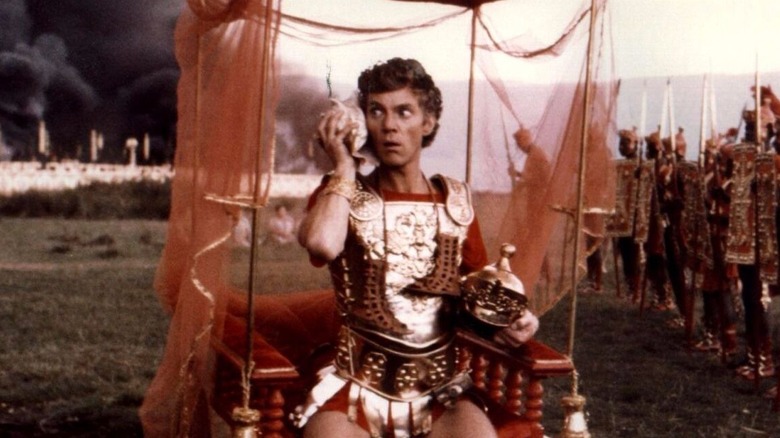The Untold Truth Of Caligula
The late '70s in cinema has often been labeled as an era full of exploitation and sexually explicit content, but "Caligula" is one of the few big-budget productions of the time that managed to get a theatrical release despite its unsimulated sex scenes and graphic violence. Following the release of other controversial and explicit films like "I Spit on Your Grave" and "Salò, or the 120 Days of Sodom," 1979's "Caligula" based much of its theatrical appeal on shock value. Along with its hardcore pornography, it also managed to fit gore, animal abuse, and sexual violence into its 156-minute runtime. Deemed an erotic historical drama, "Caligula" follows the editorialized story of the Roman Emperor Caligula (Malcolm McDowell).
Although much of Caligula's actual reign in Rome is subject to speculation, many sources refer to him as a mentally ill tyrant with a penchant for hedonism, sadism, and sexual activities (via History.com). Bob Guccione's film adaptation sought to explore Caligula's mental unraveling and the idea that "absolute power corrupts absolutely." Despite its noble — albeit superficial — message, the project was quickly met with outrage and controversy. Many film fans regard "Caligula" as long-form pornography with a loose plot. Even its star-studded cast, led by McDowell and including Helen Mirren, John Gielgud, and Peter O'Toole, couldn't save the film from being banned in multiple countries and protested across the globe — it's still allegedly banned in Canada and Iceland to this day.
In the aftermath of the film's social and legal troubles, it's clear that there's a lot that went on behind the scenes of "Caligula" that many people don't know about. That's why we've compiled a list exposing the untold truth of "Caligula."
Caligula is produced by the founder of Penthouse Magazine
The first sign of trouble began right at the conception of "Caligula," which started as a creative endeavor funded by Bob Guccione, the founder of Penthouse Magazine. Penthouse combines cultural articles with softcore pornography, so the involvement of the publication helps partially explain some of the gratuitous sex scenes in the film. Although the plot was partially based around Caligula's sexual proclivities, it was ultimately Guccione's creative vision that led to its controversy.
In an interview with Penthouse in 1980 (via Malcolmmcdowell.net), Guccione noted that he was no stranger to funding big-budget films like "Chinatown" and "The Longest Yard," but "Caligula" marked the first time that he was involved with the production of one. It was his creative input that led to such explicit sexual content throughout the film, much to the dismay of the film's actual director, Giovanni "Tinto" Brass, who eventually left the film (via Filmint).
According to The Encyclopedia of Epic Films, the Penthouse founder knew from the beginning that he wanted to make an adult movie and had a vision of intercutting Shakespearean actors with hardcore sex scenes. Some vocal objectors of the film, like academic Ranjit Sandhu via his book "200 Degrees of Failure," believe that Guccione wanted to change the laws surrounding public viewings of pornography and for him, creating a big-budget, narrative-driven adult film would provide loopholes in the legal system. That could also help explain the use of unsimulated sex scenes, which aren't particularly common in the film world (via IndieWire).
Although most critics assume that Guccione only wanted to make porn, he maintained in his 1980 interview with Penthouse that "Caligula" was not pornographic and should be considered proper art: "We've done with cinematic images what so many authors and historians have done with words."
There are few official credits on the film due to its many lawsuits
While we might be familiar with ghostwriters and uncredited, anonymous crews, rarely do films go without any writing or directing credits. As if the entire film had magically appeared out of thin air, "Caligula" does not have any official credits, but the reality is far more sinister. The production was plagued with lawsuits through post-production, which lasted from the end of shooting in 1976 to 1979 — to the extent that crew members were concerned the film would never be released. Unlike the lawsuits that tried to stop the film from screening after its release, this first round of lawsuits was from crew members who wanted to distance themselves from what they thought would be a negative, embarrassing blip on their resume (via The Spool). The original writer, Gore Vidal, sued to have his name removed after changes were made to his screenplay (per Pop Matters). The director, Tinto Brass, would disown the movie and only be credited for principal photography. Many cast members were also troubled by the production, including Anneka Di Lorenza, playing Messalina, who would also sue Bob Guccione and Penthouse International Films for sexual harassment during production.
The film's IMDb crew list also reveals over 100 uncredited names associated with the makeup, hair, and design department. Although there were multiple editors on the film, their names are not officially credited. However, they're still acknowledged in the opening credits of the film, which state, "Edited by the Production."
Director Tinto Brass disavowed the film due to the post-production change in tone
Following the film's release, rumors swirled around Tinto Brass' involvement with its final product. Both the writer, Gore Vidal, and the director, Brass, would disavow the project before it was officially released (via New York Magazine). But Brass's departure wasn't as clear, especially since he was involved with the entirety of shooting.
Initially, many critics assumed that Brass left solely because of his disagreement with Bob Guccione over the inclusion of its unsimulated sex scenes. After Brass wrapped the shoot in December 1976, Guccione returned to Rome with some of the Penthouse models to secretly film the hardcore sex scenes on set (via Malcolmmcdowell.net). He went on to allegedly lock Brass out of the editing room, insert the footage he shot, and completely change the tone Brass wanted to set with the film (via The Globe and Mail). According to "What Wild Ecstasy," While Brass was open to creating a film about sexual depravity, his vision was more artistic rather than erotic. Guccione said, "I made the biggest blunder of all time by appointing Tinto Brass," and accused him of "running up huge costs, casting actual criminals as Roman senators, and using 'ugly' women in the orgy scenes" (via New York Magazine).
Malcolm McDowell, who played Caligula, would go on to express his support for Brass and disdain for the project after its release. The actors were told there would be nudity in the film, not pornography. He said in an interview, "I'll tell you honestly, this picture still raises very unpleasant feelings in me — it was a real betrayal."
The original film was not supposed to have hardcore sex scenes
Through the '70s, adult films like "Last Tango in Paris" began to blur the lines between popular media and pornography. But when it came to "Caligula," Bob Guccione wanted to take the idea of making an X-rated adult flick even further. He said he wanted to "make a film by a major author, with a major director, major stars, and go all the way" (via New York Magazine). With this vision in mind, Guccione set out to fund an adult film with one of the largest budgets in history — except most of the cast and crew had no idea it would be an adult film (via Esquire).
While the actors like Malcom McDowell, Peter O'Toole, and Helen Mirren were initially brought on to perform scenes that included nudity and simulated sex scenes, no one would find out about the hardcore sex scenes cut into the film until after it premiered. Guccione sold the film's premise as a visual epic with lavish sets and rampant nudity — and Mirren later compared the set to a "nudist camp" — but it was not sold to them as a hardcore pornography film. "Caligula" in its finished state features everything from oral sex to money shots and everything in between. Although it's clear that Guccione's goal for the film was always going to push the limits of adult entertainment, the most explicit, unsimulated sex scenes weren't shot or included in the original storyboard until Tinto Brass had officially finished shooting the entirety of the film. Guccione and the post-production director, Giancarlo Lui, returned to the set to shoot scenes, like an infamous lesbian sex scene between Anneka Di Lorenzo and Lori Wagner (via The Guardian).
The film depicts an actual birth
In an unexpected twist, there's an infamous scene in "Caligula" that doesn't contain sexual content or violence — the film apparently depicts a real, unsimulated birth. Tinto Brass kept seven pregnant women on standby to capture a live birth for the film (per Den of Geek). Allegedly, the graphic scene was shot in three takes with three different pregnant women. Although many might assume the worst considering the controversial nature of the production, all of the doctors assisting with the birth were actual, practicing doctors with access to sterile, modern medical equipment.
As with all newly crowned ancient royalty, Caligula was expected to produce a male heir. Although the film makes it clear that their family history is full of children eventually killing their parents and vice versa, Caligula and Caesonia (Helen Mirren), were due to conceive. It comes as no surprise that the birth of Caligula's child would be an opulent, public event. The scene features the pregnant body-double for Mirren in the birthing position with her face hidden by a mask in front of an audience of Roman aristocracy. In what can only be described as the most theatrical, collaborative baby shower imaginable, attendees essentially throw their own party while the empress of Rome gives birth a few feet away. Despite the film's willingness to show obscene and unsimulated visuals, the birth scene is comparatively brief and tame — especially considering all the effort they went through.
The uncut version of the film is banned in multiple countries
Although it might feel like movies were significantly more obscene in the '70s and '80s, there were still harsh censorship laws across the world. With a project as controversial as "Caligula," it didn't take long for countries to start censoring and outright banning the film. The book "Freedom and Entertainment" details how various anti-pornography and morality groups attempted to file lawsuits against the film to prevent it from screening in cities like New York, Boston, and Atlanta. But in the United States, these lawsuits would all fail to stop the film's spread, since all of the judges would end up siding with the film. Despite its hardcore sex scenes, the Boston Municipal Court would rule that "Caligula" passed the Miller test, which determines whether speech or expression is deemed obscene (per The Washington Post).
These issues were different across the globe as various countries did not permit the uncut version to screen at all. According to the book "Caligula and the Fight for Artistic Freedom," many countries like Australia would ban the film until 1981, which is when Penthouse International Films released a 105-minute R-Rated version that cut the explicit, hardcore scenes. Other countries like Russia would continue its ban until 1993, and the United Kingdom wouldn't permit the sale of the uncut version until 2008 (via Evening Standard). The film is still, according to some sources, banned nearly 40 years later in Canada and Iceland (per History.com), though other sources report it screened in parts of Canada for at least six months. Despite the production's battle against censorship, today it is nearly inaccessible and currently isn't available on any streaming sites. It can only be purchased on DVD from independent sellers (via JustWatch).
The original screenplay was far more homoerotic
There's a lot to be said about Gore Vidal's abrupt departure from "Caligula," especially considering that prior to his legal battle with Bob Guccione, the film was called "Gore Vidal's Caligula" (via WhatCulture). It's clear that tensions among him, Tinto Brass, and Guccione reached their breaking point far earlier in the production than most of the crew. According to New York Magazine, Vidal was paid $200,000 for his screenplay but made it very clear that he was unwelcome on set and was unhappy with Guccione's edits to his work, which was allegedly supposed to be a political drama. He said, "I have the dubbing script in my possession. So I have a pretty fair idea of the sleazy porn Guccione has done with my screenplay." Guccione has implied that Vidal's original story didn't align with the Penthouse vision, stating that the original script focused almost entirely on homoerotic romance (via Malcolmmcdowell.net). Allegedly, the only heterosexual relationship in this early draft was between Caligula and his sister, Drusilla. Guccione said, "Although few changes were made, the finished film has less perverted sex than Gore's original script; it now has more heterosexual appeal."
Guccione also implied that Vidal was difficult on set. Vidal called most film directors "parasites," claiming the real visionaries behind a movie are the screenwriters (per Time). Brass and Guccione eventually banned him from the film's set (per The Seattle Times). It didn't take long for Vidal to completely remove himself from the project, with the film not crediting anyone as its writer.
The sets and costumes were reused for Messalina, Messalina!
"Caligula" might've been the most expensive adult film to create, but that doesn't mean it was necessarily profitable. In fact, from shooting through post-production, many were concerned that the film might not ever be released — which meant that the millions of dollars spent on the film would be wasted (via Not Coming to a Theater Near You). There were so many pending lawsuits against the film from the cast and crew that the co-producer, Franco Rossellini, made the choice to reuse the expensive costume and sets. "Messalina, Messalina!," the unofficial sequel to "Caligula," recycled as many of the sets and costumes from production designer Danilo Donati as possible.
The Italian sex comedy "Messalina, Messalina!" is a low-budget retelling of the relationship between Messalina (Anneka Di Lorenzo) and Emperor Claudius (Vittorio Caprioli), with Lorenzo reprising her role from "Caligula." The buzz surrounding "Caligula" resulted in a number of knock-offs, like "Caligula... The Untold Story," trying to cash in on presenting a hypersexualized ancient Roman Empire. Although many consider "Messalina, Messalina!" a sequel, it actually came out two years earlier, in 1977, due to the original film's prolonged post-production.
Aside from building the lavish, intricately detailed sets, Donati was also in charge of the costumes, jewelry, and wigs. Unfortunately, the decision to reuse his work was not approved by Donati. During the opening credits of "Messalina, Messalina!," a message appears that reads: "Certain elements of the sets and decorations created for the film Caligula by Danilo Donati have been used in the production of this film without his consent." Despite Donati's having only been paid to design the set and costumes of "Caligula," it's easy to mistake "Messalina, Messalina!" as being the same film with different actors.
Roger Ebert walked out of Caligula
It was a rare occurrence for famed Pulitzer Prize-winning movie critic Roger Ebert to get up in the middle of a screening and walk out (via Screen Rant). But even the seasoned film veteran was apparently no match for the very worst of "Caligula." Though he vowed in 2008 to "Never, ever again review a film [he has] not seen in its entirety," Ebert had quite a message for the production company and its potential audience back when "Caligula" was released in the U.S. (via The Los Angeles Times).
As one of the most controversial films of the 1970s, "Caligula" is one of the few films that Ebert couldn't finish — although he did make it through the first two hours, according to his review. The first line of his review calls it "sickening, utterly worthless, shameful trash," and he writes that it might be one of the worst movies he's ever seen. He takes specific issue with the film's portrayal of intense violence, bad cinematography, and the lack of genuine eroticism rather than "a nauseating excursion into base and sad fantasies." To sum up Ebert's thoughts in his zero-star review, he says, "'Caligula' is not good art, it is not good cinema, and it is not good porn."
